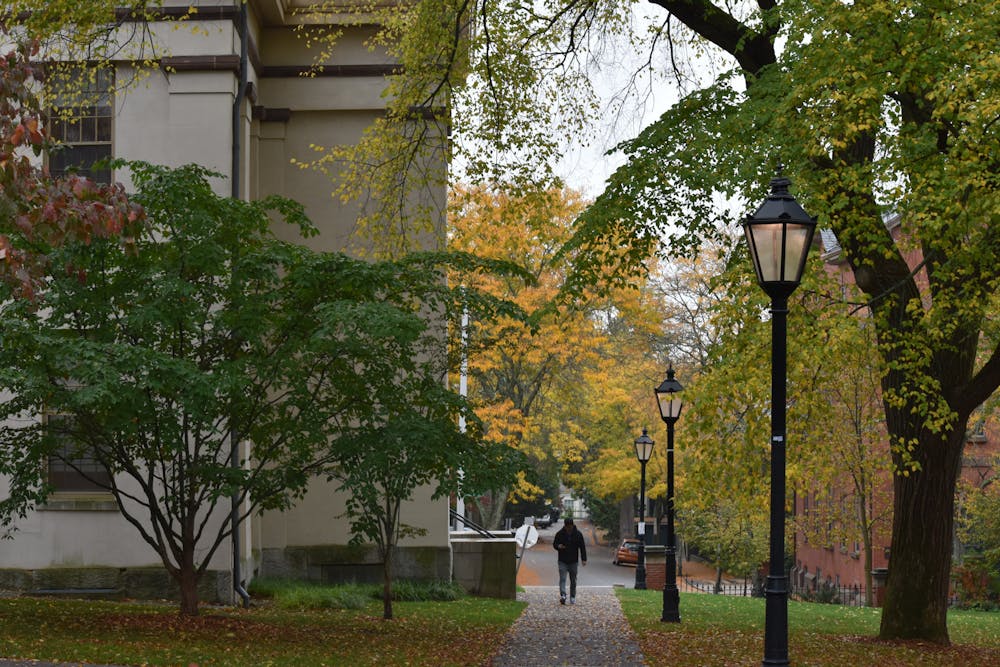At the Nov. 1 faculty meeting, University faculty members expressed support by an informal show-of-hands vote for a plan under which the first and last faculty meetings of the semester would be held in person, indicating the potential end of years of the group formally meeting exclusively on Zoom.
According to Kenneth Wong, professor of education policy and chair of the Faculty Executive Committee, the FEC will finalize a revised plan for future faculty meeting venues during their Nov. 15 meeting.
The last faculty meeting that was held in person was on March 4, 2020 — before COVID-19 forced University community members off campus.
Wong said that the FEC was dedicated to ensuring that faculty members feel comfortable with future meeting formats, as COVID-19 remains a concern for many community members.
“The risks associated with COVID are still very much alive,” he said. “We received some feedback in terms of those kinds of concerns.”
Faculty members were able to submit anonymous comments to the FEC before Tuesday’s meeting regarding their thoughts on convening in person. The Committee received a total of 59 comments, with several faculty members expressing concern about maintaining a sense of community among the faculty while also keeping equity, accessibility and safety in mind in light of persistent COVID-19 concerns.
Zoom faculty meetings provide equitable access for faculty members with childcare responsibilities, family considerations and commitments that bring them away from Providence, Wong said, citing the submitted comments. Some faculty members also expressed that they attended more meetings over Zoom than they had over their total time at the University.
“But then there are other faculty members who (expressed) that in-person meetings are very important because they create a sense of community,” Wong added. Some faculty are also “concerned about the fact that people might be on Zoom (without) actually paying attention” to meeting proceedings.
After sharing these comments, Wong presented five different options for how future meetings would be held, including: holding all meetings in person going forward; holding all future meetings remotely other than the May 26 commencement meeting; alternating between online and in-person meetings; hosting meetings in-person with a livestream component for non-participating faculty; and a hybrid option with available Zoom and in-person participation.
Wong expressed hesitation regarding the fifth option, calling it a logistical “challenge.”
“It’s complicated,” he said. President Christina Paxson P’19 “would have to manage multiple streams and paths in terms of voting and speaking with in-person and remote (attendees) at the same time.”
Kristina Mendicino, chair of German studies, said she was concerned about limiting the voting and discussion capabilities of faculty participants who can only attend meetings through a livestream for various “travel, illness or compromised immunity” reasons.
“For the sake of equity and broad participation in this period of faculty governance, I would remain very much in favor of Zoom meetings,” she said.
Carlos Aizenman, professor of neuroscience and brain science, also voiced his support for Zoom options, saying that he would be “a lot more enthusiastic about in-person meetings if (faculty members) could wear masks.”
“Many of us are immunocompromised or take care of immunocompromised people at home,” he said. “A meeting where we have 150-plus of us crammed into Salomon 001 does not feel like an accessible space for someone who is immunocompromised.”
J. Timmons Roberts, professor of environmental studies and environment and society and sociology, asked Paxson about how she would manage the logistics of facilitating discussions during hybrid meetings that allow in-person and online faculty members to participate.
Paxson responded that she was less concerned about facilitating discussions and more worried about maintaining a secure voting process across different platforms, though she noted that “it could be managed, in theory.”
Andrew Foster, professor of economics, said that he doesn’t foresee voting being an issue in hybrid meetings, as the economics department frequently uses online polls. Foster suggested making polls phone-accessible and incorporating individualized faculty IDs, which would ensure security despite requiring a more complicated set-up.
Elias Muhanna, associate professor of comparative literature and history, proposed another option where the first and last faculty meetings of the semester would be held in person and all others over Zoom. This “gives people a chance to chat after the meeting and reconnect with each other,” he said.
Paxson and Wong concluded the discussion by asking faculty members to raise their hands in order to gauge favorability for Muhanna’s suggested option of meeting in person for only the first and last meetings. Eighty-six out of the 154 faculty members participating in the informal show-of-hands vote approved the adjusted meeting plan.

Sofia Barnett is a University News editor overseeing the faculty and higher education beat. She is a junior from Texas studying history and English nonfiction and enjoys freelancing in her free time.





